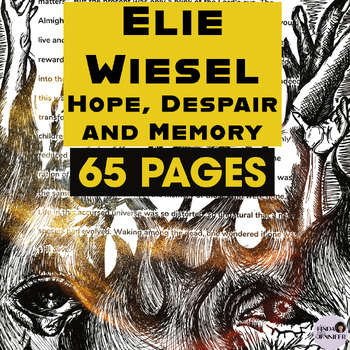

In his 1986 Nobel Peace Prize acceptance speech, Elie Wiesel strives to inform his audience of the unbelievable atrocities of the Holocaust in order to prevent them from ever again responding to inhumanity and injustice with silence and neutrality. What is the central idea of Elie Wiesel’s Nobel acceptance speech? Holocaust survivor and Nobel Laureate, Elie Wiesel, gave this impassioned speech in the East Room of the White House on April 12, 1999, as part of the Millennium Lecture series, hosted by President Bill Clinton and First Lady Hillary Rodham Clinton. Where did Elie Wiesel give the perils of indifference speech? An example of indifference is when you don’t care or put effort into something. The definition of indifference is a lack of care, concern or interest. What does Wiesel do with his anger? “: I write and i teach and my goal in both cases is to sensitize the reader or student.”` … “I can’t do anything except use my words to shout.” It means his words can alert and educate society of these horrors of suffering and inhumane. Sin and punishment are both part of being human, and indifference makes people unconcerned about them. Suffering and compassion are important parts of being human, and ignoring them is dehumanizing. How does indifference make a person “inhuman”? It leads to anger and hatred. How does indifference make a person inhuman? As you read, take notes on the experiences that shaped Wiesel’s perspective on indifference and suffering. In this speech, Wiesel discusses the consequences of indifference in the face of human suffering and his hopes for the future. What is the central idea of Elie Wiesel’s the perils of indifference speech Commonlit? If unattended, it develops into detachment and a paralyzing passivity in which the person surrenders rational judgment. That “ spiritual anemia” which is indifference has the potential to become a malignant condition. What are the consequences of indifference? He takes us back to the camps and brings us into the belief, shared with his fellow prisoners, that if only people knew what was happening they would intervene. The central theme of this speech is Wiesel’s claim that indifference is more dangerous than hatred. What is the central idea of Elie Wiesel’s the perils of indifference speech? When people are indifferent, they don’t do anything.

The same is true with hatred because people will stand up and fight against it. In many ways, indifference is worse than anger and hatred because at least when people are angry, they do something to fix the problem. Love and hate are both intense emotions that may be directed toward someone while indifference doesn’t really care one way or the other. He/she has zero presence on your thoughts and no importance in your life. Indifference,however, means you don’t give a damn. Otherwise, you wouldn’t be upset by their words or actions and start hating them in the first place. The speaker hopes to accomplish compassion in the twenty-first century for those suffering injustices around the world. The purpose of Wiesel’s speech is to persuade the audience not to be indifferent to victims of injustice and cruelty. What is the purpose of Elie Wiesel’s the perils of indifference? Why did Elie Wiesel write the perils of indifference?Įventually, Wiesel felt compelled to testify against the Nazi regime, and he wrote the memoir to bear witness against the genocide which killed his family along with six million Jews. There are more people who are indifferent than there are people who hate. “I came to a conclusion that the peril threatening human kind today is indifference, even more than hatred. What does Wiesel say about indifference in night? Indifference, after all, is more dangerous than anger and hatred. In a way, to be indifferent to that suffering is what makes the human being inhuman. What are Wiesel’s thoughts on indifference answer? Then they will feel abandoned and forgotten. As a result, indifference is more frightful than anger and hatred because it does not give victims a chance to express themselves. You disarm it…Indifference is not a response.” (Wiesel, 2).


 0 kommentar(er)
0 kommentar(er)
